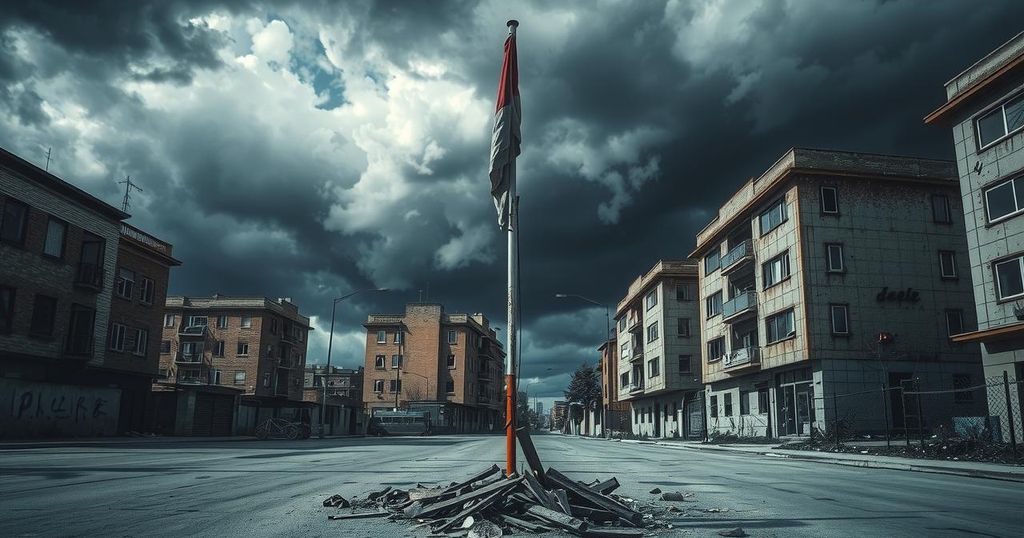The Democratic Republic of Congo is experiencing a resurgence of violence due to the M23 rebel group’s aggressive expansion from Goma, prompting grave humanitarian concerns. Over 400,000 individuals have been displaced, with international reactions deemed insufficient. The conflict’s dynamics are complicated by historical ethnic tensions and the DRC’s vast mineral resources, essential for global technologies.
The Democratic Republic of Congo (DRC) is currently engulfed in a violent insurgency led by the rebel group M23, which is intensifying a conflict that has persisted for decades. This group aims to expand its territorial control from Goma, a strategically vital city in the east. As hostilities escalate, the United Nations has raised alarms regarding the potential for further regional instability, given the nation’s vast mineral resources crucial for technology.
The DRC’s history is marred by conflict since its independence from Belgium in 1960. The latest surge in violence, primarily involving clashes between national troops and M23 insurgents, has led to significant civilian casualties and displacement. Specifically, over 400,000 individuals were reported displaced last month alone due to the fighting, and Goma is facing dire humanitarian conditions, with corpses in the streets and critical resources such as water and electricity being cut off.
International reactions have been tepid; while some nations recognize the urgency of the crisis, their responses have been criticized as inadequate. For instance, Romanian mercenaries assisting the Congolese forces surrendered amidst fierce fighting, seeking refuge at a U.N. peacekeeping base. Commentary from experts has suggested that the West’s hesitance might allow competitors like China and Russia to gain influence in the region.
M23 is primarily composed of ethnic Tutsi and arose from historical tensions and conflicts, particularly during the Rwandan genocide in 1994. The group’s claims to defend Tutsi rights have drawn accusations that it receives support from the Rwandan government. Rwanda’s involvement and its longstanding ties with M23 contribute to the complexity of the conflict, hindering peace efforts initiated through past agreements.
The DRC is rich in minerals crucial for global technologies, including cobalt, which is primarily controlled by Chinese interests. While the region’s instability poses significant risks to resource extraction, experts indicate that for the moment, the supply chains remain secure. Nevertheless, China has publicly condemned M23’s actions, warning of the conflict’s escalating dangers.
Rwanda’s role is crucial but controversial, as its past incursions into DRC faced international backlash, impacting foreign aid relations. Despite this, Rwanda continues to receive substantial support from Western nations due to its strategic value in the region. Some Western governments have begun reconsidering their diplomatic and economic ties with Rwanda amid the unfolding conflict, but aid seems largely uninterrupted as M23 continues its aggressive campaign.
The Democratic Republic of Congo has endured persistent violence and turmoil since its independence from Belgium in 1960. The recent actions of the M23 rebel group indicate a resurgence of longstanding ethnic tensions, particularly in relation to the Tutsi population. The DRC is home to vast mineral wealth, particularly cobalt, which is essential for modern electronics and electric vehicles, raising the stakes for international interests in ensuring stability in the region. Historical conflicts, partnerships, and peace efforts further complicate the current situation, demanding global attention and intervention. The DRC’s geographic vastness and resource-rich landscape make it a focal point for various armed groups and international stakeholders. The interplay between local grievances and external influences remains critical in understanding the conflict’s trajectory.
The DRC is currently facing a resurgence of violence led by the M23 rebel group, compounding decades of conflict and struggling humanitarian conditions. The international response has been criticized as insufficient amid fears of expanding chaos in a mineral-rich region. The intricate challenges posed by historical tensions, regional alliances, and global economic interests underscore the urgent need for a comprehensive and targeted diplomatic approach to restore stability and protect civilians.
Original Source: www.nbcnews.com






